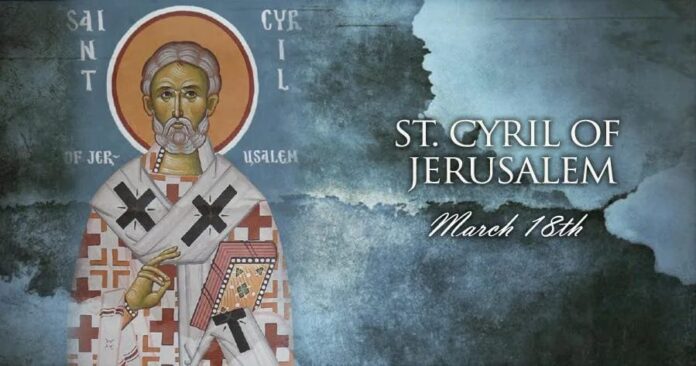St. Cyril was a fourth-century bishop and Doctor of the Church whose writings are still regarded as masterful expressions of Christian faith.
He had an exhaustive Biblical knowledge and endurance in the face of misunderstanding and opposition. Cyril was born in Jerusalem around the year 315, shortly after the legalization of Christianity throughout the Roman Empire.
Although that legalization put a stop to many of the persecutions that threatened the Church for two centuries, it indirectly gave rise to a number of internal controversies – both in regard to theology, and the jurisdiction of bishops – in which Cyril would find himself involved.
Cyril received an excellent education in classical Greek literature as well as the Bible. He was ordained to the priesthood by Bishop Maximus of Jerusalem and succeeded him as bishop in 348.
During his early years of bishophood, he delivered a series of lectures to new initiates of the Catholic Church. Twenty-four of the lectures have survived and are studied today.
In 351, three years after Cyril became the Bishop of Jerusalem, a large cross-shaped light appeared for several hours in the sky over the city – an event that many interpreted as a sign of the Church’s triumph over heresy. It could also, however, be understood as a sign of the suffering the new bishop would undergo in leading his flock.
Unlike many other Eastern bishops and priests of the fourth century, Cyril did not allow his classical learning to lead him away from believing in the full humanity and divinity of Christ.
He was against the heresy. This led to Cyril being exiled from Jerusalem three times in the course of 20 years.
He appeared at the Council of Seleucia in 359, in which the semi-Arian party was triumphant.
In 381, St. Cyril participated in the Second Ecumenical Council, which condemned two different forms of Arianism and added statements about the Holy Spirit to the Nicene Creed of 325. St. Cyril of Jerusalem died in 387 and was named a Doctor of the Church by Pope Leo XIII in 1883.



